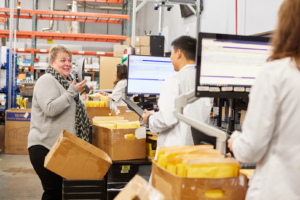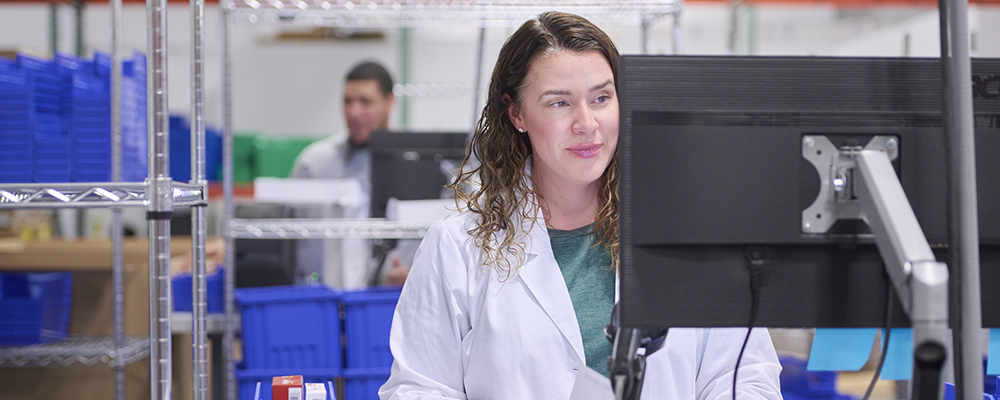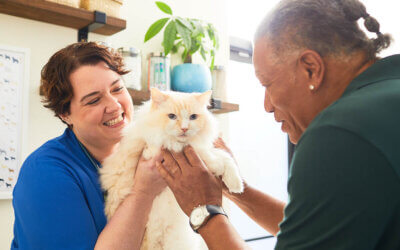Do you ever wonder what happens to your patient’s prescription once you send the order? How does the correct product, dosage, and quantity arrive at your client’s doorstep so quickly? The answer is the veterinary pharmacists at Vetsource. Every day, the pharmacy team works together to review and monitor thousands of prescription orders with impeccable detail and expertise.
Clinical support pharmacists provide first line of defense
Before Tinamarie Pontes, PharmD, became a veterinary pharmacist, she worked for a human health pharmacy. She notes she received many pet-related questions from her human patients.
“I’d tell them to ask their vet. Humans and animals are so different — a human pharmacist isn’t going to know some of the nuances involved in veterinary pharmacology,” Dr. Pontes explains. But the idea of working for a veterinary pharmacy was never far from her mind. “It seemed like a dream job, but what are the odds of becoming a veterinary pharmacist?”
Apparently, the odds were in Dr. Pontes’ favor. When a friend and Vetsource pharmacist mentioned a job opening at Vetsource’s pet pharmacy, Dr. Pontes leaped at the opportunity. “I loved it instantly — the quirks of being a pet pharmacist, the things we experience on a daily basis, and the company culture…it’s all great,” she says.
Now in her sixth year at Vetsource, Dr. Pontes works as a clinical support pharmacist. She also guides new pharmacists through the extensive company training process.
Dr. Pontes and the other clinical support pharmacists are responsible for:
- Pre-checking orders — They are the “first line of defense” in ensuring the medication, dosage, and administration method is appropriate for the species, sex, age, and weight of the patient.
- Answering phones — They take medication consult calls from veterinary practices, receive new prescriptions, and answer client questions.
- Solving problems — The pharmacists handle incorrect, incomplete, or problematic prescriptions, often reaching out directly to the prescribing veterinarian.
- Reviewing drug utilization — The team reviews the medical conditions, possible contraindications, and other therapies prescribed to screen for drug interactions. They also confirm that pets aren’t prescribed duplicate products and prevent excessive refills of controlled substances.
- For home delivery orders containing controlled substances, the pharmacy team completes the necessary state-level reporting.
“A love of animals with technological joy and pharmaceutical elegance”
Another pharmacist, Reginald A. Carey, PharmD, agrees there’s a lot to learn with veterinary pharmacology. That’s one reason he enjoys being the lead preceptor for the Portland, Oregon, pharmacy. He’s responsible for “wrangling the interns” who come to Vetsource from Oregon State University’s College of Pharmacy.
“Veterinary pharmacy allows pharmacists to meld a love of animals with technological joy and pharmaceutical elegance,” Dr. Carey says. “It’s very satisfying.”
 For Fiona Steele, PharmD, solving problems is one of the most satisfying parts of the job. “I can look at the prescription and try to figure out what’s going on,” Dr. Steele says. “I enjoy reaching out to the clinics.”
For Fiona Steele, PharmD, solving problems is one of the most satisfying parts of the job. “I can look at the prescription and try to figure out what’s going on,” Dr. Steele says. “I enjoy reaching out to the clinics.”
Problem-solving is also Dr. Pontes’ favorite aspect of the job, but she can’t overlook the humorous parts. Over the years, she’s encountered unique pet names — like Two Socks Shakur — and fun comments in pet profiles. One pet owner entered “he’s handsome and he knows it” in the medical conditions tab of the pet’s profile. “The work can be repetitive, but there are these little sparks of joy that happen all the time and bring a smile to my face,” she says.
Clinical fulfillment pharmacists oversee final review
When Shawn Chan, PharmD, recently came across a canine flea and tick preventative prescribed for a pig, the Vetsource clinical fulfillment pharmacist relied on the work of his problem-solving pharmacist teammate.
“We never really see [canine medications prescribed for pigs],” Dr. Chan explains. “But the [clinical support] pharmacist left a note in the computer after they called the practice to verify the prescription was correct. Apparently, the practice prescribed it for off-label use.”
As a clinical fulfillment pharmacist at Vetsource’s Portland pharmacy, Dr. Chan physically checks the products after they have been approved by clinical support pharmacists and filled by pharmacy technicians. This check includes:
- Overall quality
- Quantity
- Expiration date
- Appropriate species
These pharmacists also ensure temperature-sensitive products, such as insulin, are properly packaged, and that the prescriptions are prioritized properly and scheduled for delivery with the correct shipping method.
If something seems amiss during the pharmacist’s check, they review any notes left by the clinical support pharmacist. When everything matches, the pharmacists scan the product and packaging labels and send the package to shipping.
An impressively low error rate
 Despite a whopping 1,200–2,000 prescription verifications per day per clinical fulfillment pharmacist, the impressively accurate team and their detailed process catch an occasional error.
Despite a whopping 1,200–2,000 prescription verifications per day per clinical fulfillment pharmacist, the impressively accurate team and their detailed process catch an occasional error.
“We might catch one to three errors a day,” reports Caroline Mantey, PharmD. “Sometimes none at all. Our error rate is very low, and the most common errors are duplications or expiration dates.”
Vetsource’s advanced technologies and processes — as well as the veterinary-specific training and continuing education courses (CE) taken by Vetsource’s pharmacists to broaden their knowledge and stay current on new medications — contribute to an incredibly low error rate of less than 1 in 62,000.
Dr. Mantey thinks the low error rate could also be attributed to great employee morale. “I appreciate how much they care about our mental health here,” she says. “The whole culture here is different. They really care about us.”
Dina Washburn, PharmD, who works as a clinical fulfillment pharmacist at Vetsource’s East Coast pharmacy in Pennsylvania, agrees. “Working here has been such a breath of fresh air,” says Dr. Washburn, who previously worked in a human retail pharmacy and struggled with a lack of support and interpersonal connections. “It has renewed my passion for pharmacy.”
Pharmacy triage manager a unique role for veterinary pharmacists
Some of Vetsource’s pharmacists don’t fall into the categories above. Wendy Halver, PharmD, works as Vetsource’s pharmacy triage manager and often finds herself doing a little bit of everything. During a typical day, she might be a “pharmacist, manager, supervisor, administrator, and pharmacy leader.”
With her team of technicians, Dr. Halver helps manage communications between pharmacists and clinicians over prescription discrepancies, ensuring the highest level of transparency, safety, and customer service. She says her team’s main focus is continuous quality improvement: “My job is to make everyone’s jobs better, and to serve our customers better.”
Catalog support pharmacist uses knowledge to research and write
The product descriptions and details that appear in the online store are written by Vetsource’s catalog pharmacist, Dawn Johnson, PharmD.
As a girl, Dr. Johnson dreamed of becoming a veterinarian, and she worked as a technician for 10 years in her late teens and early 20s. When she chose pharmacy school, she expected her veterinary path to end.
But after several years in retail and home infusion practice on the human side, one of Dr. Johnson’s friends shared a Vetsource job listing and she couldn’t pass it up. “I know how veterinarians work and what they’re treating, and that knowledge helps educate our pharmacists,” she says.
Dr. Johnson began working as a Vetsource clinical fulfillment pharmacist nearly 12 years ago, but her role has evolved as the company has grown. As the catalog pharmacist, she’s responsible for researching, writing, and publishing information about each prescription and over-the-counter item to the online store. Those descriptions are then used as a reference for pharmacists, call teams, pet owners, and veterinary practices.
Dr. Johnson’s catalog work allows her to combine her veterinary and pharmacy experience. “I really enjoy closing the knowledge gaps, educating the team, and being that person who helps guide people to the answers,” she says.
Veterinary pharmacists doing what they love
Most of Vetsource’s pharmacists began their careers in human retail pharmacies and they couldn’t be happier working in veterinary medicine today.
“There’s just so much compassion and unconditional love in this field,” Dr. Pontes shares. “If I’m talking to someone, even if they’re really upset, I can share a story about my pet and their attitude will completely change. I love being able to make that connection with people.”
Learn more about Vetsource’s pharmacists and how they can support your team and your clients.



